Is Shopify Legit? Why You Should Choose Shopify?
In the world of eCommerce, Shopify has emerged as a prominent platform for individuals looking to establish their online businesses. However, concerns about its legitimacy that really become a matter of concern. This article aims to address the question, “Is Shopify legit?” and provide 5 valuable tips to safeguard oneself from potential scams.
This article covers 4 main parts:
- What is Shopify, and how does it work?
- Is Shopify legit? 4 reasons you should trust Shopify
- 6 scams you should watch out for
- 5 tips to provide a safe shopping experience for your customers
What is Shopify?
Before getting to learn is Shopify legit, it’s important to understand what Shopify is.
Shopify is an eCommerce platform that enables you to create, manage, and grow your online stores. Thanks to the borderless nature of eCommerce, you can create a Shopify store and start selling globally without a physical address.

Overall, Shopify is a simple-to-use tool for beginning an online business. It comes with a great selection of well-designed Shopify themes and over 8,000 Shopify apps to further enhance your store. With Shopify, you may connect and operate all eCommerce features like inventory management, marketing, payments, and shipping in one single dashboard. Increasing your sales and expanding your reach is just a breeze.
On top of that, Shopify doesn’t require any knowledge of technology to build your online presence. In fact, this platform takes care of every technical element, like hosting, SSL certificate, and so on. Therefore, even when you are a new eCommerce comer, you can always start selling online with Shopify.
Dive into the world of Shopify with our resources:
- Shopify Review: Is Shopify The Crown Jewel of The eCommerce World?
- Shopify Tutorial: 9 Complete Steps to Get Instant Sales
- How Much Does Shopify Pricing Cost?
Not ready for a commitment? Shopify offers a 3-day free trial for every merchant registering an online store. After that, you may continue to use Shopify for $1 per month for the first three months to test out the water.
Now that we have a quick understanding of Shopify, let’s move on to the biggest question. Is Shopify legit?
Is Shopify Legit? 4 Reasons You Should Trust Shopify
There’s no doubt that Shopify is one of the best eCommerce platforms in the market. But before opting for this solution, we are sure that you will wonder: “Is Shopify legit?”.
In this section, we will explore 4 main reasons why you should trust Shopify as a legitimate and trustworthy platform. We hope that with they will help you answer the question, “Is Shopify legit?”
#1. Shopify provides a safe and secure platform for selling
When it comes to online transactions, security is of utmost importance. Shopify understands this concern and prioritizes the safety of its users. This platform employs robust security measures to protect both sellers and buyers.
SSL certificate
One crucial aspect is the implementation of SSL Certificate for all Shopify online stores. It ensures that customer data, including personal information and payment details, are securely transmitted over the Internet. This encryption safeguards against unauthorized access and helps establish trust between the customer and your online store.

In our analysis, the best thing about this platform is that it automatically equips your website with an SSL Certificate when you start a Shopify store. There’s no need to worry about purchasing one since Shopify has covered it for you.
PCI compliant
Shopify is certified level 1 PCI DSS compliant. The PCI DSS (Payment Card Industry Data Security Standard) is a globally recognized security standard that ensures the secure handling of credit card information.
By complying with PCI, Shopify demonstrates its commitment to maintaining high-security standards, protecting sensitive payment information, and reducing the risk of data breaches.
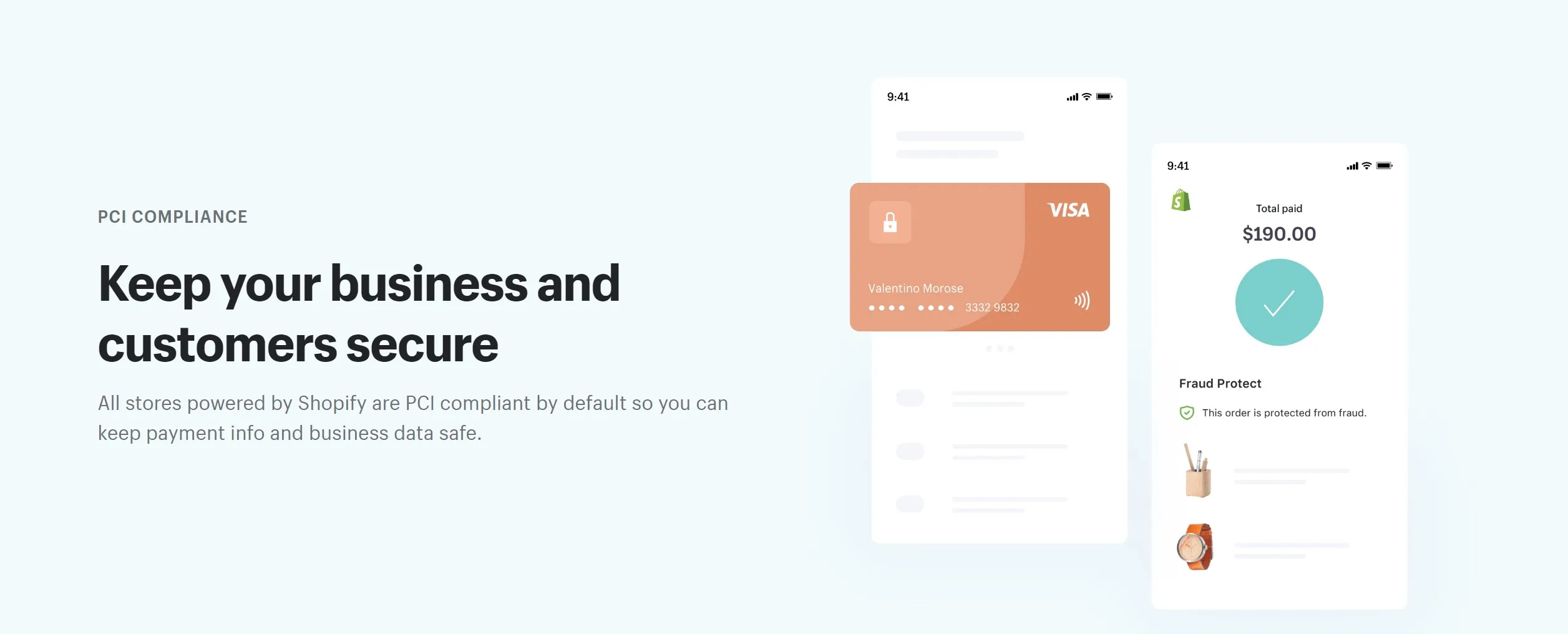
By default, Shopify ensures that all its stores adhere to PCI compliance standards. Therefore, you can rest assured that all your information is securely proceeded and stored.
Security updates and patches
Shopify continuously monitors and updates its security systems to stay ahead of potential threats. They invest in advanced technologies and employ a team of security experts to identify and mitigate vulnerabilities.
By choosing Shopify, you can have peace of mind knowing that your online store is built on a secure foundation.
Want to migrate to Shopify?
If you are intending to migrate to Shopify, LitExtension offers an excellent migration service that helps you transfer your data from the current eCommerce platform to a new one accurately with utmost security.
#2. Shopify offers transparent pricing plans with no hidden fees
From our experience, Shopify’s transparent pricing plans are another reason to trust Shopify as a legitimate platform.

This platform provides clear and straightforward Shopify pricing plans, enabling you to understand and budget your expenses accurately. The subscription tiers are designed to cater to businesses of all sizes, from small startups to large enterprises.
Additionally, Shopify offers an in-house payment solution called Shopify Payments, which eliminates these transaction fees. By using Shopify Payments, you can save on transaction costs and simplify your financial management. To learn more about this built-in Shopify feature, stay tuned! We will further discuss it in the latter part of our article.
With that being said, it’s important to note that while there are transaction fees for external payment gateways, Shopify is transparent about these fees and clearly communicates them to you.
💡 Here’s how Shopify calculates your transaction fees:

As you may see, this transparency ensures there are no hidden charges or unannounced fees. Hence, you can plan and manage your business finances effectively.
#3. Shopify Payments is highly secure
As mentioned earlier, Shopify offers its own built-in payment solution called Shopify Payments. This integrated payment gateway provides a seamless and secure checkout experience for your customers.

Shopify Payments is powered by Stripe, a leading global payment processor known for its robust security infrastructure. With Shopify Payments, you can accept credit card payments directly on your online store, streamlining the purchasing process for your customers.
The transactions processed through Shopify Payments benefit from the same high-level security measures mentioned earlier, including SSL encryption and PCI DSS compliance.
#4. Shopify only allows trusted third-party apps to appear on their App Store
When it comes to expanding the capabilities of your store, what sets Shopify apart is its commitment to ensuring the quality and trustworthiness of the apps available on its platform.

Before an app or plugin is listed on the Shopify App Store, it goes through a rigorous review process conducted by Shopify’s team of experts. This review process includes evaluating factors such as functionality, security, and user experience. Shopify only approves and showcases plugins that meet their strict Shopify app requirements.
By curating the apps on Shopify App Store, Shopify takes measures to protect its users from potential scams or malicious software. This careful selection process helps to ensure that the plugins available for download are safe, reliable, and compatible with the Shopify platform.
Additionally, Shopify encourages user feedback and reviews for the listed apps. This allows the community of Shopify merchants to share their experiences and rate the performance of the plugins they have used. These ratings and Shopify reviews serve as an additional layer of transparency, enabling you to make informed decisions about which apps to integrate into your stores.

By maintaining a curated App Store and prioritizing the security and quality of plugins, Shopify gives you the confidence you need to leverage third-party plugins without compromising the security and functionality of your Shopify stores.
Don’t forget to check out our recommendations on the best Shopify apps for you:
- 15+ Best Shopify Apps for Any Type of Website
- 25+ Free Shopify Apps To Boost Your Sales
- 15 Best Live Chat Apps For Shopify To Enhance Customer Experience`
6 Scams You Need To Watch Out For
In an eCommerce environment, with both challenges and opportunities, it’s essential to be aware of potential scams that can compromise your financial security and hinder your success.
Therefore, as you navigate the eCommerce landscape, keep an eye out for the following scams and take necessary precautions to protect yourself and your business. In this part, we will list 6 scams you need to avoid based on our experience.
#1. Shopify store duplicator schemes
One scam to watch out for involves fraudulent individuals or groups who create duplicate Shopify stores to deceive unsuspecting customers. These scammers copy the design and layout of legitimate online stores, often selling counterfeit or low-quality products. They may lure customers with attractive prices or promotional offers and then disappear once the payment is made.
To avoid falling victim to such scams, always verify the legitimacy of an online store by checking for customer reviews, ensuring secure payment options, and validating the store’s contact information.
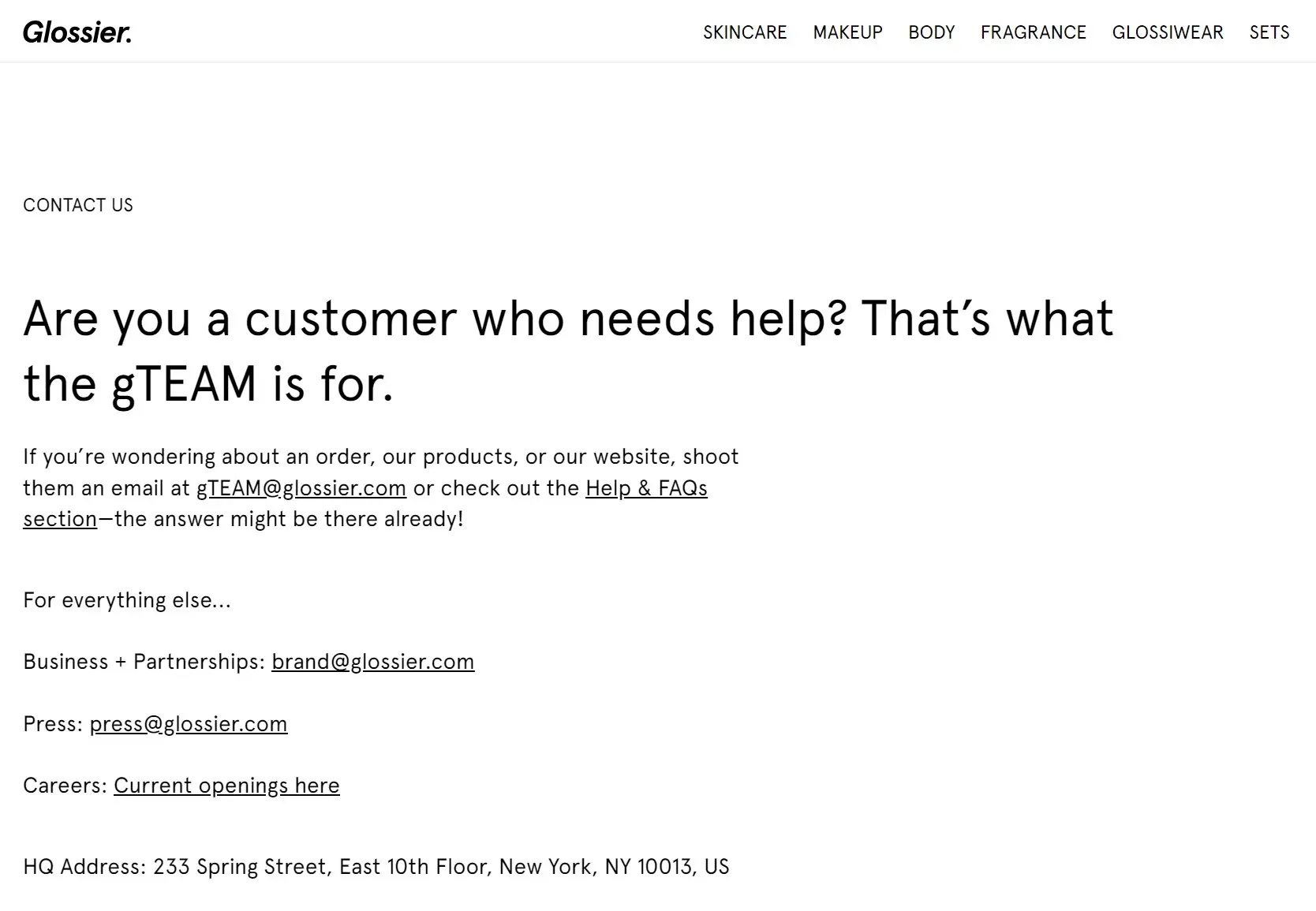
#2. Triangulation schemes
Triangulation schemes occur when a scammer uses a legitimate online marketplace, such as Shopify, to facilitate fraudulent transactions. In this scheme, the scammer poses as a seller, listing popular products at remarkably low prices.
When a customer places an order, the scammer purchases the product from a different website using stolen credit card information, shipping it directly to the customer. The customer receives the product but remains unaware of the illegal activities behind the scenes.
To avoid falling prey to triangulation schemes, purchase products from trusted sellers, thoroughly research the store and seller before making a purchase and be cautious of unusually low prices.
#3. Fake return ticket
Some scammers pretend as dissatisfied customers seeking returns or refunds. They may claim to have received a faulty or incorrect item and request a return.
In this scam, the fraudster provides a fake return tracking number or ships an empty package to your store address, ultimately tricking you into refunding the money without actually returning the product.
To protect yourself from fake return ticket scams, establish a clear return policy, require valid tracking numbers for returns, and carefully inspect returned items before issuing refunds.
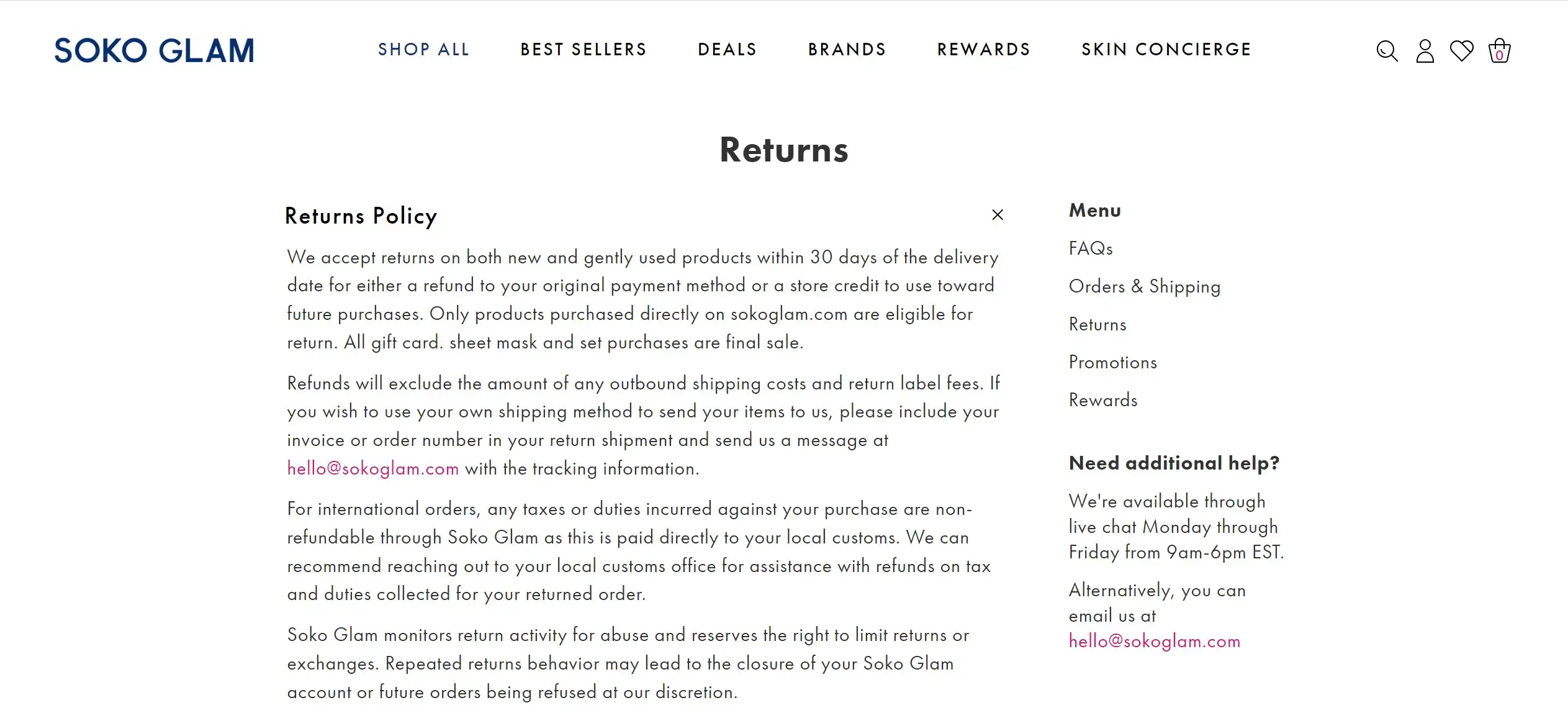
#4. Direct client scheme
In the direct client scheme, scammers contact you posing as potential customers or wholesale buyers. They claim to be interested in making large orders or establishing business partnerships.
However, their intention is to obtain free samples or products without paying or to convince the seller to provide discounts or credit terms and never fulfill the promised purchase.
To avoid falling victim to this scam, exercise caution when dealing with unfamiliar clients, conduct background checks on potential buyers, and establish secure payment terms and procedures.
#5. Switching scheme
The switching scheme involves scammers who seem legal purchases. They use stolen credit card information. After receiving the products, they contact you, claiming the items are damaged or incorrect.
They propose returning the products but sending back similar-looking or lower-value items instead. This way, the scammer obtains a refund while keeping the original products.
To mitigate the risk of switching scams, carefully document product details, photograph items before shipping, and implement stringent quality control procedures upon receiving returned items.
#6. Fake purchase orders
Scammers may submit fake purchase orders, especially to suppliers or dropshipping businesses. They pose as legitimate customers or businesses, providing detailed order information and requesting immediate shipment.
However, the payment they provide, such as a fraudulent check or stolen credit card information, fails to clear or is later reported as unauthorized.
To protect yourself from fake purchase order scams, verify the authenticity of the order by conducting due diligence on the customer or business, confirm payment before shipment, and be wary of rushed or unusually large orders.
By familiarizing yourself with these common scams and implementing precautionary measures, you can safeguard your Shopify stores and mitigate the risks associated with online.
5 Tips to Provide A Safe Shopping Experience for Your Customers
We hope that when you reach this section of our article, you have found the answer for “Is Shopify legit”. Now, let’s move on to the next session: How you can provide a safe and secure experience for visitors coming to your store.
Here are five essential tips to help you build trust and provide a safe shopping experience for your customers on your Shopify store that we have experienced and collected.
#1. Make pricing and return policies clearly
Firstly, transparency is key to building trust with your customers. You should display your pricing information, including additional fees or charges, to avoid customer surprises at checkout.
Thus, you need to ensure your return policy is easily accessible and clearly outlines the returns, exchanges, and refund process. By being upfront about pricing and return policies, you set clear expectations and demonstrate your commitment to fair and honest business practices.
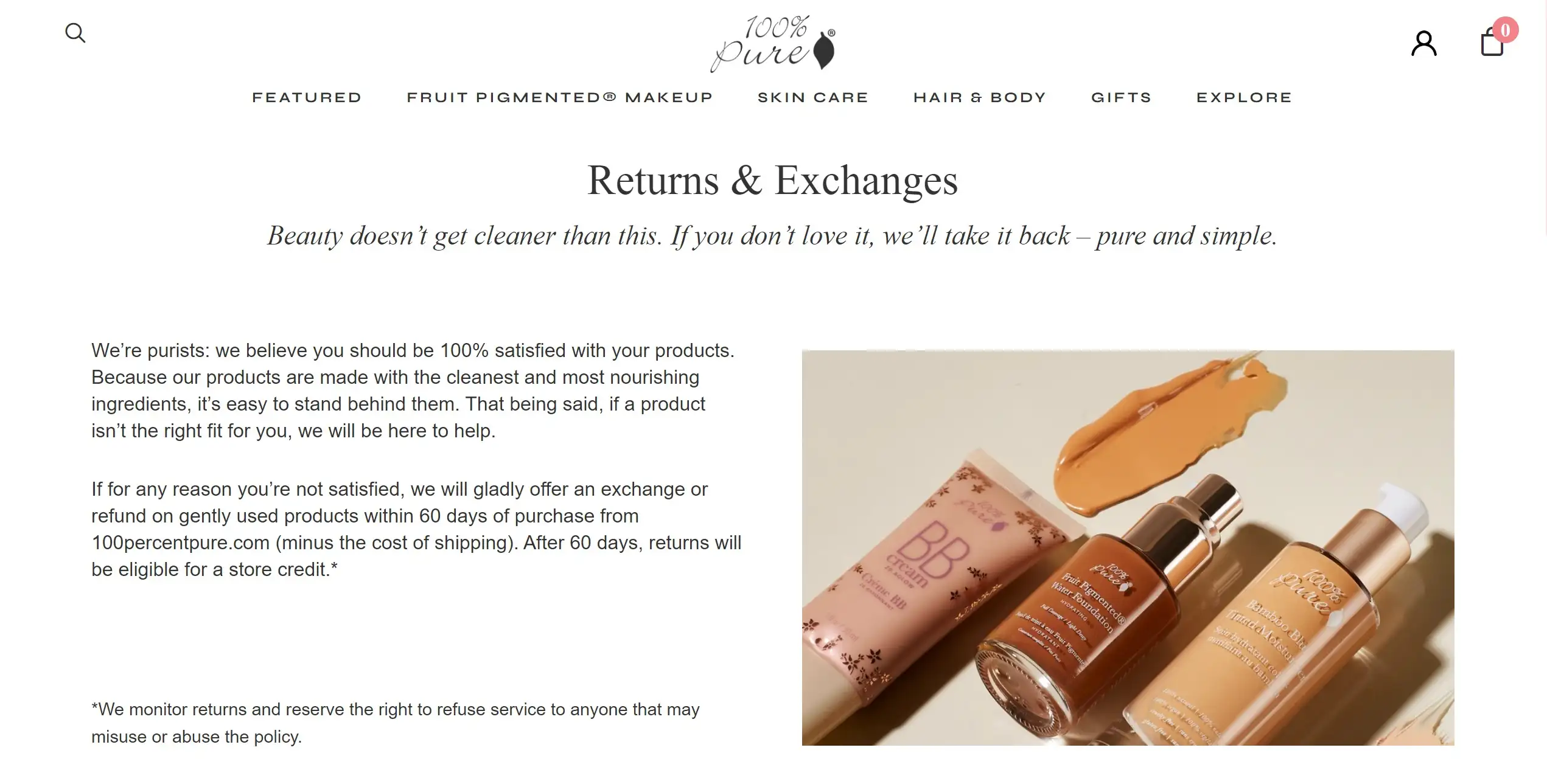
#2. Ensure customers know the site is safe
Instilling confidence in your customers regarding the safety and security of your website is crucial. So you have to display trust badges and security seals on your Shopify store.
These visual indicators reassure customers that their personal and payment information is protected during transactions. Additionally, communicate your data privacy practices and assure customers that their information will be handled securely and responsibly.
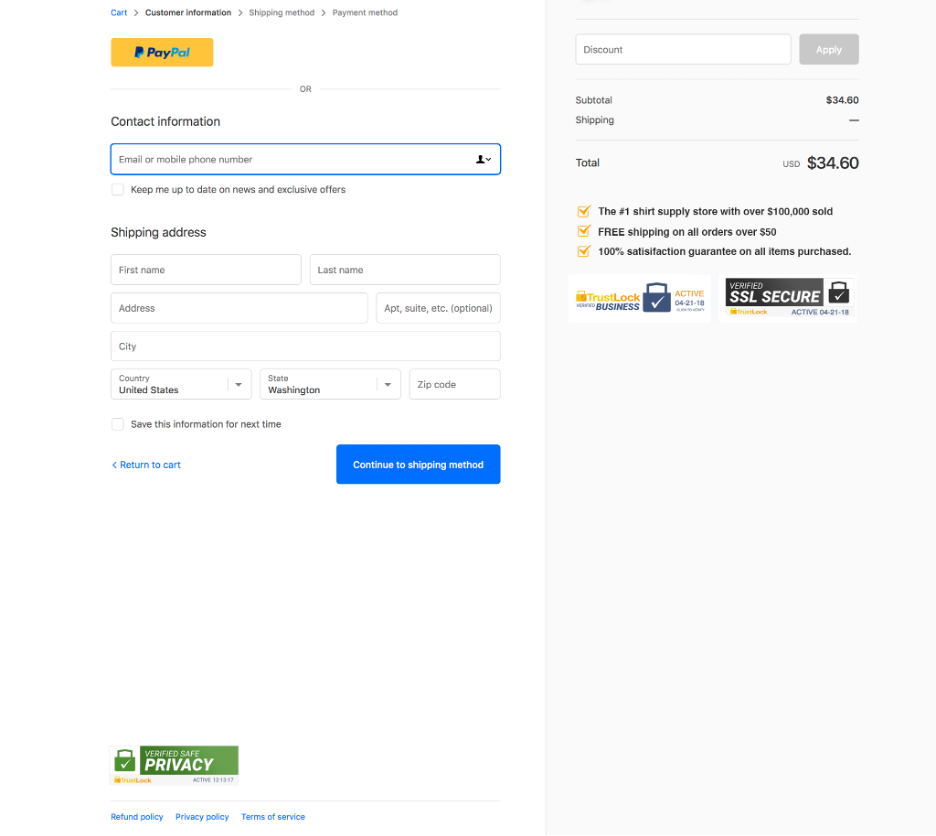
#3. Show the people behind the brand
On another note, humanizing your brand is one effective way to build trust with your customers. Show the people behind your business by featuring staff profiles, customer testimonials, and behind-the-scenes content. And this personal touch helps customers connect with your brand on a deeper level and builds credibility.
Also, adding real photos and true stories creates a sense of authenticity that resonates with customers and enhances their perception of your business.
#4. Be a social (media) butterfly
Engaging with customers on social media platforms can promote a safe and positive shopping experience. You must make sure that you always have an active social media presence and promptly respond to customer inquiries, comments, and concerns. Addressing customer issues publicly demonstrates your commitment to excellent customer service and showcases your responsiveness.

Besides, you may encourage customers to reach out to you through social media channels, providing an additional avenue to voice their concerns and receive timely support.
#5. Get ratings and reviews
Additionally, customer ratings and reviews are vital in establishing trust and credibility for your Shopify store. You should encourage satisfied customers to leave reviews and ratings for their purchases. Then, prioritize displaying these reviews prominently on your website to showcase the positive experiences of previous customers.
You can add reviews to Shopify and display them on your store by using review apps like Ryviu or Yotpo.
In fact, your authentic and unbiased feedback builds confidence in potential buyers and helps them make informed purchasing decisions. Remember to respond to both positive and negative reviews professionally and helpfully. This shows that you value customer feedback and are dedicated to addressing any concerns that may arise.

In addition to these five tips, don’t forget to regularly monitor your store for any suspicious activity or signs of potential scams. Stay updated on the latest security practices and trends in eCommerce to protect your customers’ information proactively. Implementing strong password policies, utilizing secure payment gateways, and conducting regular security audits are essential to maintaining a safe shopping environment.
Remember, a safe shopping experience fosters customer loyalty and satisfaction and contributes to your Shopify store’s long-term success. By prioritizing transparency, security, customer engagement, and authentic feedback, you can build a trustworthy brand that customers will feel confident in returning to time and again.
Is Shopify Legit – FAQs
[sp_easyaccordion id=”60197″]
Is Shopify Legit – Final Thoughts
And that brings us to the end of our article on “Is Shopify legit”.
In conclusion, Shopify is a legitimate and trusted eCommerce platform that provides a safe environment for online businesses. By following the five tips outlined in this article, you can further enhance your security measures, protect your customers from scams, and confidently navigate the world of eCommerce on Shopify. Stay vigilant, be informed, and enjoy the benefits of a secure and successful online business.
Last but not least, if you want more insight into the world of eCommerce, please visit the LitExtension blog and join our active eCommerce community!
